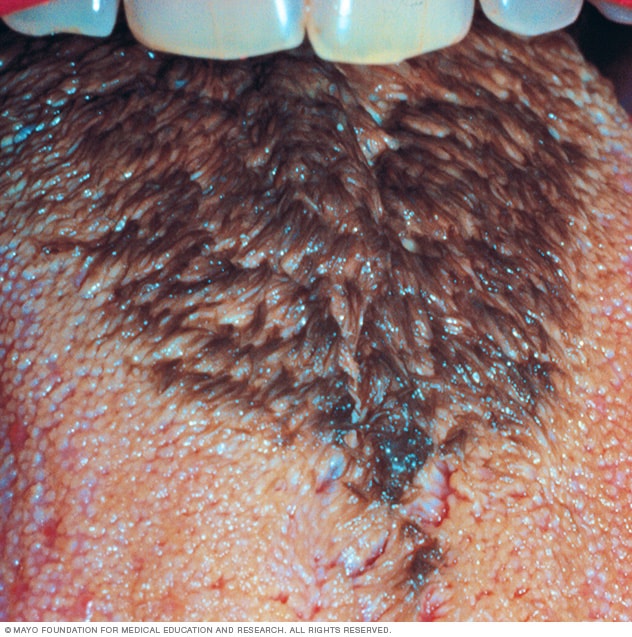Overview
Black hairy tongue

Black hairy tongue
Black hairy tongue is caused by a buildup of dead skin cells on the tiny bumps on the tongue called papillae. Food, drinks, tobacco, bacteria or yeast, and other substances can get trapped on the papillae and stain them.
Black hairy tongue is a condition of the tongue that gives it a dark, furry look. The look usually results from a buildup of dead skin cells on the many tiny, rounded bumps on the surface of the tongue. These bumps, called papillae, contain taste buds. When these bumps become longer than usual, they can easily trap and be stained by tobacco, food, drinks, bacteria or yeast, or other substances.
Black hairy tongue may look alarming, but it's usually painless and doesn't cause any health problems. The condition usually goes away by dealing with the causes and by regular mouth and tongue cleaning.
Products & Services
Symptoms
Symptoms of black hairy tongue include:
- Black color of the tongue, but the color may be brown, green, yellow or white.
- A hairy or furry look to the tongue.
- Changed taste or a metallic taste in your mouth.
- Bad breath.
- Gagging or tickling feeling in your mouth, if the papillae are very large.
- Rarely, a burning feeling on the tongue if hairy black tongue is caused by a yeast or bacterial infection.
When to see a doctor
Though it doesn't look good, black hairy tongue is usually a harmless condition. It's usually short term when steps are taken to get rid of or manage the cause.
See your healthcare professional or dentist if:
- You don't know what's causing black hairy tongue and want to talk about what steps to take.
- You're worried that it might be related to a health issue.
- Black hairy tongue doesn't go away even though you brush your teeth and tongue twice a day.
Causes
Black hairy tongue usually happens when the many tiny, rounded bumps on the tongue, called papillae, grow too long because they don't shed dead skin cells. Food, drinks, tobacco, bacteria or yeast, and other substances can get trapped on the papillae and stain them. This makes the tongue look dark and hairy.
The cause of black hairy tongue can't always be found. Possible causes of black hairy tongue include:
- Changes in the healthy bacteria or yeast found in the mouth when taking antibiotics.
- Poor cleaning of the mouth and tongue.
- Dry mouth.
- Eating a soft diet that doesn't help to rub dead skin cells from your tongue.
- Regularly using mouthwashes that have oxidizing agents, such as peroxide, that can irritate your mouth.
- Using tobacco.
- Drinking a lot of coffee or black tea.
- Regularly drinking large amounts of alcohol.
- Certain medicines.
- Having a condition that lowers your ability to fight infections, such as cancer or HIV.
Risk factors
Poor mouth and tongue cleaning, dry mouth, and eating only soft foods may raise your risk of black hairy tongue.
If you're male or an older adult, if you smoke, or if you've had hairy black tongue in the past, you may have a higher risk of the condition.
Dec. 22, 2023